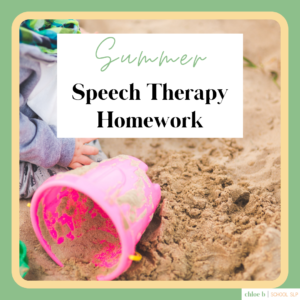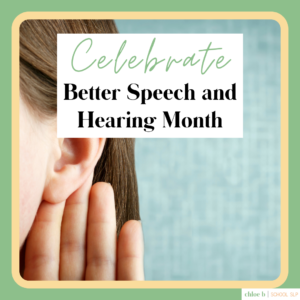Finding the right graduate program is critical for your overall knowledge, growth, and success as a future speech-language pathologist. Grad schools with speech pathology may all sound inviting, but there are certain things you want to look for in a program. It’s important to explore all of your options because this is a major (and costly!) decision! My advice is to use this as a guide to see which schools you are interested in! But apply to several!
A speech therapy graduate program becomes like a second home. It is the foundation for your future career, so it’s not something to choose lightly. Your peers will become your (hopefully close) friends, your professors will become valuable mentors, and you will use the skills you acquire every day on the job!

What to Look For in Grad Schools with Speech Pathology
Specialized Professors –
I don’t think most programs have 1 professor for each specialty area in speech pathology, but you definitely want a variety of professors that all specialize in different things. It would not be helpful to have a program where the professors have similar expertise. Do you know what area you might want to work in? If you’re really interested in dysphagia (swallowing disorder) for example, then make sure your program has an expert in this area!
The programs you are considering should all have websites that let you read about the faculty. If not, make sure this is an important talking point when you visit campus. Sometimes professors in our field have PhDs and almost strictly work on research. That’s great and all, but I promise you that you need more than theoretical knowledge. Does that program have professors that have actually been in the field and treated these disorders? Do they have real life knowledge to share?
Access to Various Equipment / Tools –
This was something that my graduate program had over all the others that I considered. This isn’t crucial, but it’s certainly ideal. In the real world, you will most likely do your clinical notes/paperwork on a computer. My program used an electronic filing system and electronic paperwork. This was great for being able to easily pick up different programs at different clinical rotations or in the jobs that I’ve had.
In our dysphagia class, we got to watch a student get scoped. Then in our voice class, we got to use various related equipment. In our AAC class, we got to practice with expensive devices such as eye tracking AAC devices. When working with autistic clients with sensory regulation needs, we got to use various tools. We had access to a very large materials closet with lots of things to choose from! This enabled us to gain exposure to a lot of resources and learn how to utilize them in therapy.
IMPORTANT – Clinical Opportunities
This next part is HUGE! You are going to learn a lot in classes, but you will learn so much more from your clinical settings. In class you learn a lot of theoretical background knowledge, but your clinical internships/externships will be what provides you what you need to know to actually do the job.
I’ve seen some programs that don’t let you have clients until your second semester of first year. Some programs let undergraduate students start seeing clients. I prefer seeing clients right away, but I didn’t like how long my grad program kept us at the university clinic. It’s great for the first year, but the second year (including summer) should be various clinic sites (with different supervisors) on a part time basis. Ourr final spring semester was full-time at two different clinical sites and I liked that. I had a medical setting (I spent two days outpatient adults and three days inpatient hospital with the same SLP) from January – mid March. I had a school setting (preschool, and I wish I had an elementary setting instead because I already had so much preschool experience from another site) from mid March to May.
What’s important is that you truly get all of your adult and pediatric hours. I’m not a fan of the SimuCase / electronic fake patients if you can get the real thing. (Totally understand that COVID-19 made this difficult!) But you just can’t compete with real life experience! And having amazing, kind, helpful supervisors is the best EVER. Fight for good ones!
What I Based My Decision On – Financial Aid
Ultimately, the component that actually determined which graduate school I went to was financial aid. The school I went to for undergrad did not offer any financial aid other than a graduate assistantship. This was just a 10 hour a week job for a professor that got you spending/book money. I was awarded that, but I would still have massive student loans.
The school that I ended up choosing was private and had amazing financial opportunities. I applied for a fellowship not expecting to get it at all – I was SO surprised when I was chosen! It gave me completely free tuition, free healthcare, completely paid for me to go to Fiji to complete a research paper, and gave me $1,000 every month as money to live off of. Other students got their tuition paid for by working around campus for 20 hours a week. We were all so thankful to graduate debt free!
The Best Advice I Can Give You on Grad Schools with Speech Pathology –
The best advice I can give you is to talk to students in the program!! You can get an honest look at how strong the program/professors are and what clinical settings are available. This is how I found out that the school I was considering even offered financial aid. Ask the hard questions. Express any concerns. Students will likely be more honest than professors or recruiters!

Grad schools with speech pathology can be difficult to get into. If you have any questions about the process to apply or any questions about what to look for in a program, drop a comment below, DM me, or email me at chloebschoolslp@gmail.com. I love hearing from you and am happy to help in any way I can!
You may also like…
If you haven’t made it through your undergraduate courses yet, check out this post for info on your bachelor’s degree that you will need before you even apply to grad school! If you’re wanting to prepare for graduate school, I love this YouTube video with 5 tips!
-Chloe B | School SLP






2 Responses